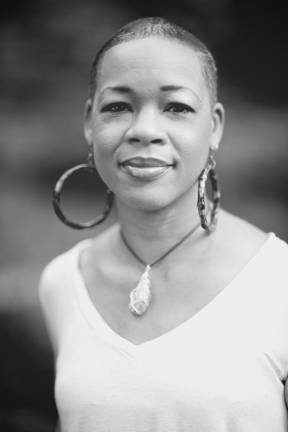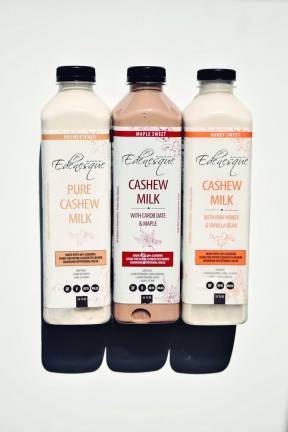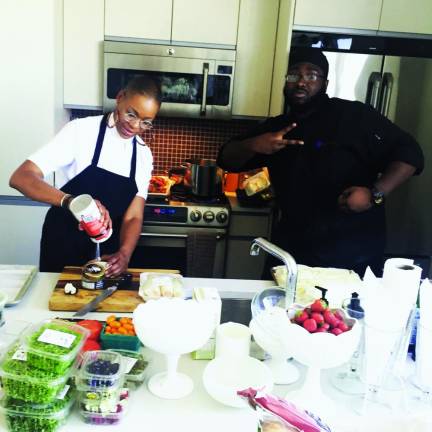Integrity over shelf life
Leslie Woodward is making a nut milk that’s about community as much as cashews



Interview by Becca Tucker
Let’s start at the beginning. Were you born a foodie? I’ve always been interested in food. One of my favorite activities growing up [in Detroit] was going to the grocery store. And then at church on Sundays we would have dinner at church and I was always in the kitchen helping my grandmother, at church and at home.
It’s always been something that naturally attracted me – food and the kitchen. I did not think that it could be a career, initially, but when I moved to Orlando, Florida when I was there, I wanted an opportunity at Roy Yamaguchi’s restaurant. They had just opened the restaurant there. We had kind of a private showing because I was working for the Convention & Visitor’s Bureau at the time. I said, ‘Hey can I come in on Saturdays and work for free, you don’t have to pay me, just kind of see if I would like the culinary profession?’ And so three hours turned into five hours turned into 12 hours, and I loved it. And they were like, ‘Well we need to pay you for your work.’ And I’m like, ‘No no no, don’t pay me, ‘cause I like the freedom of not being an employee, you know what I mean?’
Really, you didn’t want to get paid? I didn’t want people telling me I had to be here, and be boxed in in that sort of way... even though I was there and on time and everything.
Eventually you did become a chef. For six years you were head chef at the Columbia University president’s house. How’d you get from there to starting a nut milk company? I have a background in holistic nutrition, and so I used to customize juice cleanses depending on someone’s particular physical ailments or whatever their goals were or whatever. So at the end of the juice cleanse I would make nut milks. And I found out that I really, really like making nut milks. So for the next couple years I did a lot of market research. I was in Brooklyn and Queens and all over Orange County and all over Westchester County doing maybe seven, eight markets a week, just trying to get information and a diverse demographic and seeing: What do I have to do to make this work? I said okay, I want this to be a business, a real business, and therefore I had to transition into wholesale. We got the opportunity in Kingston, they were opening up a food incubator. Last year we started pasteurizing the milks and we started selling at the Kingston farmers market and we got into our first grocery store in January.
Then the pandemic hit, so I ceased operation for about a month, then opened up and now we’re in five or six grocery stores and online. Now I see there’s a different momentum happening with the business – maybe I’ve changed?
Talk about that momentum. There’s more support for my product for whatever reason. It just feels like, I guess from a spiritual perspective, that things are opening up, for me and the business. I feel sometimes when that happens, maybe I am the change. Maybe I am being more aggressive, or more assertive in the ways in which I am handling the business, energetically.
What’s tricky about nut milk? It’s very sensitive. It’s a low-acid product, which means that the shelf-life is short and bacteria grows quickly. Your facility has to be very, very clean. There can’t be any other scents around. I can’t produce next to someone who’s making truffle oil, you know? It’ll absorb the scent or the flavor. I can only sell it raw, I can only sell it directly to the customer. To sell it wholesale I have to do some sort of pasteurization, then I need pasteurization equipment.
It’s the hardest thing in the world to do. I don’t know why I didn’t just, like, bake a cookie or something [laughs].
So why didn’t you just bake a cookie? What was most important to me is not the what, it was the process and the ethics of creating clean food. One of the things I got from holistic nutrition, why I studied sociology at Columbia, is because I wanted to understand the nutrition-deficient diseases that plague communities of color. And I didn’t want to reduce it down to a simple analysis of culture or economy. I felt that I needed to unpack that question a little bit more deeply. Now we know it’s a bunch of factors that play in.
That’s what I really care about, is local food, creating a product that’s very clean, that you can trust, that kind of goes against the grain. You know, this product separates. The shelf life, even with pasteurization, is not as long as some of the other nut milks out there, and I think I’m okay with that. Now does that make great business sense? Probably not. But I’m not looking to be this national business, because I figure if we were to go that route I would have to compromise the authenticity of the product and then my ethics and my values. And so if I’m saying community, community, community, uplifting those in the community with our product and through our actions as a company, then if I’m trying to be in Minnesota that’s not really uplifting my community on a micro level. And so I think growing into a regional business is something we can do with our model, working with Cornell to extend the shelf life a little bit, but we have to maintain integrity. The bottom line is not always important – you could make millions and still have integrity, right? I think.
I don’t know. I haven’t figured that one out. I mean, people are getting sick and dying from the way in which we process food. It just doesn’t make any sense. And then people are starving at the same time, and there’s so much food waste, especially during this pandemic. We threw away so much food, and then the food lines are wrapped around the corner. Come on, we couldn’t figure out how to get potatoes in Iowa to the food bank down the block? We can figure everything else out.
What is it that we care about? And that shows in our actions and the way in which we treat people – the least among us. Nourishing people: long story short, that’s why I created the company.
Nuts are not easy to source locally. What are some local ingredients you use? The oat milk we’ll be launching this week, the oats are locally sourced. The honey, the maple are local.
Where are the oats from? Hudson Valley Hops and Grains. He’s an organic farmer in Ancramdale who even infuses biodynamic practices in his farming, so he’s one of great ethic and moral character.
Edenesque means lush or fertile (I looked it up). How’d you come up with the name? I wanted something that represented the purity of the product, going back to the way in which we used to eat, you know, sort of back to the original garden. And then ‘esque’ was, okay, this is not the Garden of Eden, but [laughs] it’s something like that.
What’s the long-term vision? This is the dream, actually: having a little storefront, and then having an ice cream truck, soft serve, using healthy options – goji berry, whatever – and then also have the milks and make custards and that sort of thing. I have formulas for all of them. I’ve already tested it on the soft-serve, so I know that it works.
Do you have employees, or is it just you? I have about three at the moment. Two of them are those with disabilities – we have an open hiring practice. And then I have some other young people who help with sales at the farmers market. I’m also very interested in hiring – and I have hired – those who are previously incarcerated. Because I just feel like we all need a little bit of grace, and we all need opportunity. Okay, you do your time, you made a mistake. We all make mistakes, some of us just haven’t got caught for it. When they come out, we have to still lift them up. If we lift them up then we’re only lifting ourselves up, too. We have to in some way cut down that rate of recidivism. I guess it’s highest because you know, it’s private prisons making money. We are such a capitalistic society – it’s just like, gosh okay, we could have a little bit of capitalism but could we have a little bit of altruism too? Do we have to kill everything, do we have to destroy everybody, do we have to enslave people?
Would it be fair to say your mission is to use capitalism to heal capitalism? I guess I said, okay, I have a talent for the culinary arts that’s natural. What can I do? I guess the prayer was, I want to be able to be used in order to be of service somehow. What can I do to help out a little bit? It’s sort of that basic. How can I help a little bit? Let me do my part. I mean, I’m not one to protest and march down the streets every weekend, but I can do it in different ways, you know?